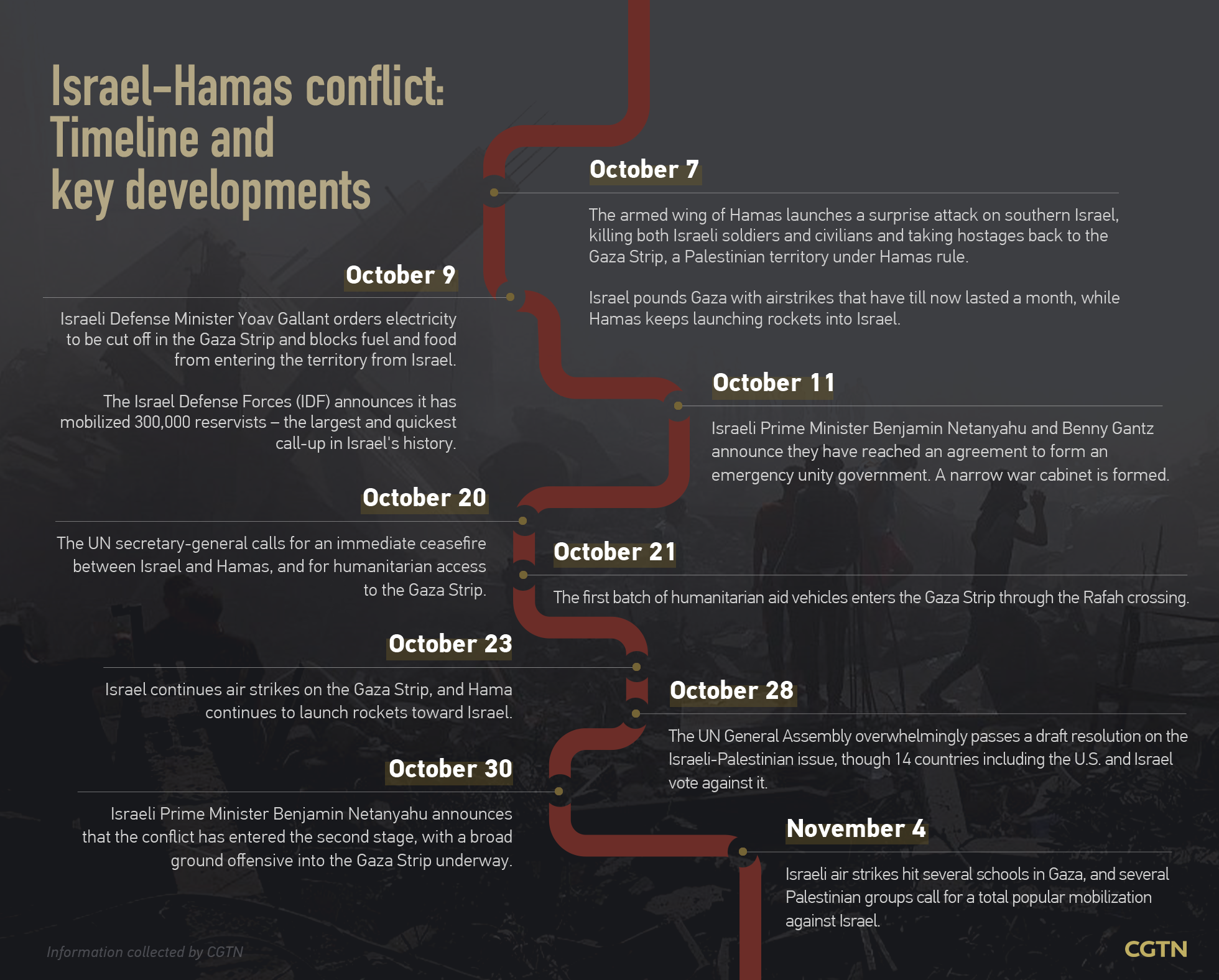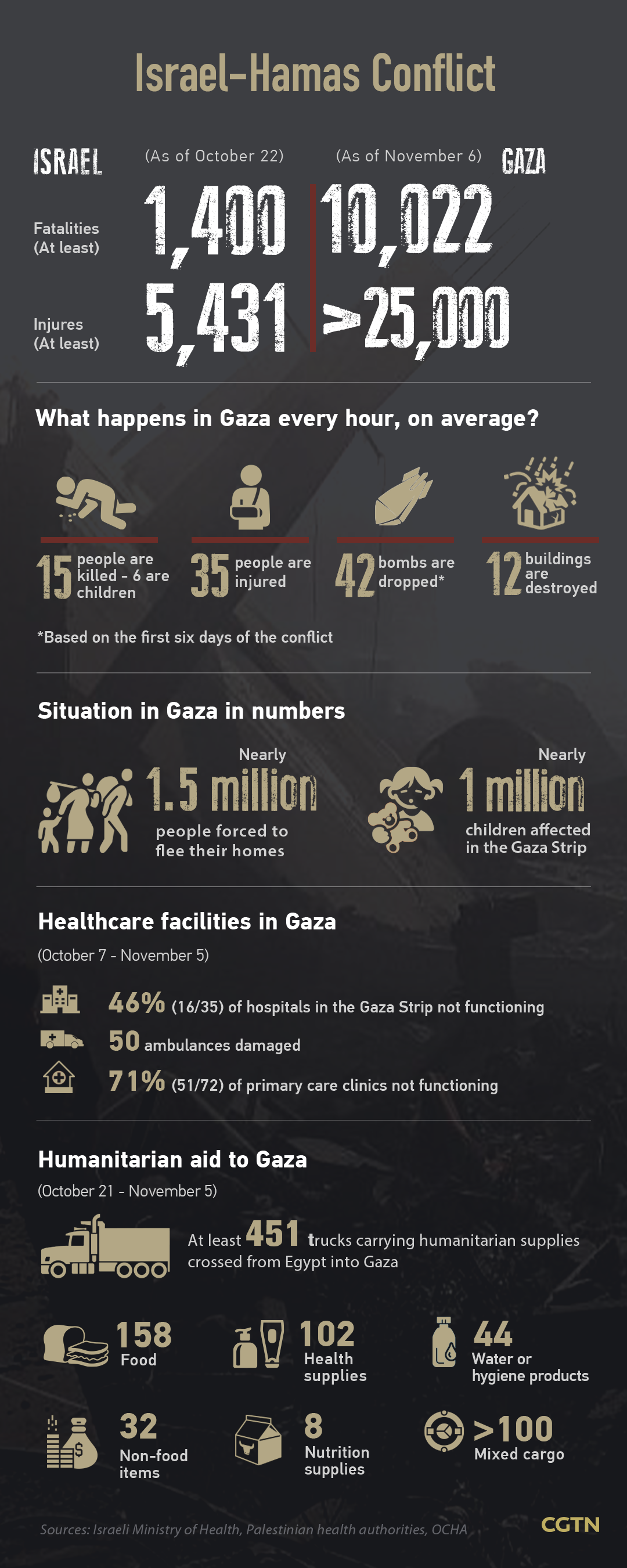On October 7, fighters from Palestinian militant group Hamas stormed southern Israel in a premeditated incursion, killing both Israeli soldiers and civilians and taking hostages back to the Gaza Strip, a territory ruled by Hamas. The attack, unprecedented in both the scale and intensity, has set off a barrage of Israeli airstrikes on the Palestinian enclave as well as a full-scale ground offensive aimed at removing the group from power.
The world has watched closely, with both civilian communities and national governments shifting their focus from the brutality of Hamas' assault to the extreme humanitarian crisis in Gaza, a repercussion incurred by what world leaders call Israel's indiscriminate retaliation. The war has now entered its first month, but what's expected is a prolonged conflict that will continue to place hundreds of thousands of civilian lives in danger.
'No ceasefire'
As Israel, which said the war had gone into a "second stage" over a week ago, intensified its military activities in Gaza, calls for a ceasefire have grown but were met with rejection from its leaders. Israeli Prime Minister Benjamin Netanyahu said on Sunday there will be no ceasefire without the return of all of the more than 240 hostages captured by Hamas.
The rebuff to a truce was followed by Israel's announcement that its troops have divided the northern and southern parts of Gaza, as communications across the besieged territory were temporarily cut Monday for a third time in the past month. The Israel Defense Forces (IDF) is reportedly set to move into Gaza City, where the IDF has recently completed its encirclement.
In response to Israel's claims of successful advances, Hamas warned that Gaza would be "the curse of history for Israel" and that Israeli troops would be carried home in body bags. The group has so far released four female hostages, a result of mediation efforts by Qatar and Egypt, and said it will free an unspecified number of foreign captives in the coming days.
Despite worldwide condemnation, Israel's military campaign has enjoyed full backing from its Western allies, especially the United States, which affirms Israel's right to defend itself while pouring billions of military aid into its most-valued Middle Eastern ally. U.S. Secretary of State Antony Blinken, during a trip to Arab countries, on Sunday espoused Israel's rejection of an immediate halt to its military action, citing concerns that Hamas would be allowed to regroup and commit violence on Israel again.

Four weeks into the conflict, military experts say they see no end in sight to Israel's military campaign, an observation supported by Hamas' well-equipped arsenal and an extensive network of underground tunnels constructed by the group. But in the meantime they say the Israeli government doesn't have an end goal for its invasion, regardless of the stated objective of "wiping Hamas off the earth," a rhetoric they believe is partly designed for public consumption.
The war also has the potential of spilling into a broader conflict, say Middle Eastern experts, who are divided over the risk of whether Iran-aligned groups in Lebanon, Syria and Yemen would get fully involved. Hezbollah, whose fighters have engaged in constant clashes with Israel, and the Houthi movement, which has launched drone and missile attacks on the country, have so far refrained from entering an all-out regional war, a possibility they have warned about.
Diplomatic isolation
Hamas' attack, which had a main objective of disrupting Israel's improving relations with the Arab world, has brought the Palestinian issue into the global spotlight and effectively derailed a prospective normalization deal between Israel and Saudi Arabia. Further straining ties between Israel and the rest of the world have been exacerbated by its deadly air bombardments, which have not only wiped out entire neighborhoods but also targeted infrastructure critical for the protection of civilians, such as hospitals, schools and refugee camps.
Since the war broke out, a number of countries have pulled their ambassadors from Israel, with the latest being Chad, an observer state in the Arab League, and South Africa, which said its decision was prompted by "the refusal of the Israeli government to respect international law and the United Nations resolutions with impunity." Türkiye, Jordan, Bahrain, Chile and several other South American countries were among those having recalled ambassadors.
Israel's diplomatic isolation can also be felt in the United Nations General Assembly, which on October 27 adopted a non-biding resolution urging an "immediate humanitarian truce" in Gaza. The measure, passed by a vote of 120-14 with 45 abstentions, was angrily dismissed by Israel as it said it would use "every means at our disposal" in fighting Hamas.
The UN Security Council, however, has failed multiple times to reach a motion due to the U.S.' repeated use of its veto power.
'Humanitarian catastrophe'
UN Secretary General Antonio Guterres, in a statement strengthening his calls for a cease fire, said on Monday that "the nightmare in Gaza is more than a humanitarian crisis. It is a crisis of humanity."
The Palestinian enclave was becoming a "graveyard for children," he said.
A month after the war broke out, about 1.5 million people – over half Gaza's population – have been internally displaced. According to the UN Office for the Coordination of Humanitarian Affairs (OCHA), nearly 50 percent of those displaced are taking refuge in facilities run by the United Nations Palestinian refugee agency (UNRWA). Tens of thousands of others are crowding into hospitals and churches.
While Israel's bombings of civilian neighborhoods have devastated UNRWA's effort to assist people in north Gaza - the stronghold of Hamas fighters - the situation in the south, which is targeted relatively less by Israeli airstrikes, is also severe. The UNRWA shelters that are further away from Israel are packed, and many of those who fled home can only sleep in the streets close to the shelters, OCHA said.
Meanwhile, only thousands of people in the north have moved southward after Israel called on them to evacuate from the area that has been the focus of its ground incursion, according to OCHA. Fear, road damages and restricted communications were the key reasons impeding their movement.

Aid deliveries to Gaza have been slow. The Rafah border crossing with Egypt, the only gateway for urgent supplies, has allowed 451 trucks carrying food, water and health supplies to arrive in the enclave since limited deliveries resumed on October 21. Jordan, with Israel's assistance, announced on Monday that it had airdropped medical supplies to a field hospital in Gaza.
The ongoing conflict between Israel and Hamas has claimed the lives of 10,022 people in Gaza, including over 4,100 children and 2,600 women, according to the health ministry in the coastal enclave. Israel said the number of those killed in the Hamas attack reached at least 1,400.
The IDF said it has lost 30 troops since the ground operation began late last month. Hamas and other militant groups have kept pounding Israel with rocket strikes, though most of these rockets failed to exert real damage as they either fell into open areas or were intercepted by Israel's air defense system. In Israeli communities near the restive borders with Gaza and Lebanon, tens of thousands of civilians have been evacuated to other parts of the country.
Families of those captured by Hamas, along with the international community, are anxiously calling for the group's release of the hostages.
(Cover: Israeli forces are deployed on the border with Gaza in southern Israel on November 5, 2023, amid the ongoing battles between Israel and the militant group Hamas. /CFP)
(Graphics by Sun Yiwen)



